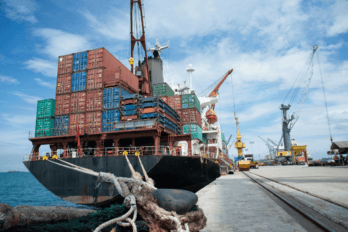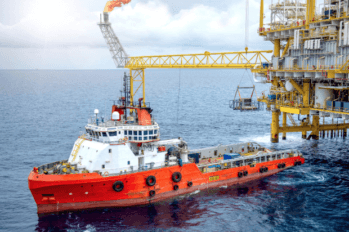
AWARD WINNING MARITIME LAWYERS
When an employer or third-party negligently operates a vessel that puts seamen in danger, they can be held liable for the resulting injuries and other damage. If you or someone you know has been injured or killed while working offshore, contact the Houston maritime accident attorneys of Dax F. Garza, P.C. today to discuss your case at no cost. There is limited time to act following a Texas maritime accident, so don’t delay.
- $1.1 Million Maritime Accident Case Result
- $2.75 Million Maritime Injury Case Result
Why Should I Hire a Maritime Accident Lawyer?

Maritime lawyers focus their practices on offshore injuries. If you are injured in a maritime setting, you need someone with understands this unique area of law and has experience successfully resolving offshore injury claims.
Types of Maritime Accidents
Maritime accidents are unique due to the physical nature of the work and the hazards the high seas come with. Accidents in open water require swift and tactful thinking, where safety training and equipment are heavily relied on. Without proper training and routine vessel maintenance, an accident’s impact can double down in terms of destruction. There are many reasons a maritime accident can occur, such as failure to maintain the vessel, improperly trained workers, navigating dangerous conditions, and more.Common types of maritime accidents can include:
Offshore Oil Rig Accidents

Cruise Vessel Accidents
Cruise Vessel Accidents put the lives of thousands at risk – including passengers and crew. As a popular travel method, hundreds of cruise ships are docked in United States ports at any given time. Cruise vessels docked in the U.S. must meet strict deadlines; and, a rush to meet schedules often leads to senseless and preventable offshore injuries.
Commercial Fishing Accidents
Commercial Fishing has had the help of reality television to showcase just how dangerous and grueling the work can be. Commercial fishing vessels come into contact with harsh weather; and, heavy equipment and machinery combined with unstable conditions can lead to severe injuries and fatal accidents, including fishermen being thrown overboard or knocked unconscious after being struck by an object.
Tugboat Accidents
Tugboats are generally called in as a safety measure but can cause a maritime accident, especially when the driver has limited visibility due to the large vessel it is towing. Tugboat accidents can turn an already dire situation into a catastrophe if they are not controlled correctly.
Large Cargo Ships and Crude Oil Tanker Accidents
Large Cargo Ships and Crude Oil Tanker are used for the transportation of cargo goods and other materials. Often these types of large vessels are used to transport volatile chemicals. The safe transportation of such materials depends on the quality of storage that a vessel is equipped for. If a vessel has inadequate storage features a chemical could come in contact with other volatile substance leading to a deadly chemical reaction.
Understanding Your Rights Under Maritime Law
Maritime laws are designed to safeguard against daily risks working in the maritime industry. Understanding your rights under these laws is crucial in the event of a maritime injury. Whether you’re an offshore worker aboard an oil rig, a deckhand on a commercial fishing vessel, or a harbor worker on the docks, you are entitled to certain protections by law.
The Longshore and Harbor Workers’ Compensation Act
The Longshore & Harbor Workers’ Compensation Act (LHWCA) is a federal law granting workers’ compensation for injured port and/or dockworkers. The LHWCA also covers seamen working on navigable waters within the U.S. The Act ensures injured workers are properly compensated when a work-related injury requires medical care, vocational rehabilitation, or missed workdays. The LHWCA also covers survivor benefits, extending a deceased maritime worker’s benefits to their beneficiaries.
Death on the High Seas Act
The Death on the High Seas Act (DOHSA) is a federal law that provides financial compensation to the families of seamen who died on the job, beyond three nautical miles off the shore of the United States. This Act allows a civil action to be brought against those responsible for offshore wrongful death and provides compensation to surviving beneficiaries.
Jones Act
The Jones Act is a federal law that permits injured crew members to sue their employer for financial damages after being hurt at work. If you are a seaman injured on the job due to employer negligence, you are entitled to recover lost wages, loss of earning capacity, medical bills, pain and suffering, and more. You will be able to recover maximum financial compensation for yourself and your loved ones with the help of an experienced maritime lawyer.
Maintenance and Cure
Maintenance refers to room and board, which means food and housing payments such as mortgage, rent, homeowners’ insurance, property taxes and utilities, among other such related items. Cure is the cost of all reasonable medical expenses required as a result of the workplace injury along with the costs of transportation to and from related medical visits.
General maritime law requires employers to cover certain costs for maritime workers who are injured while working on a vessel. This obligation typically ends once a seaman reaches maximum medical improvement (MMI). These costs are called maintenance and cure.
Liability for Maritime Accidents
Determining liability in the case of an offshore accident can be complicated. Various parties can be held responsible, including the ship’s owner, the employer, or the manufacturer of faulty equipment. Wrongful actions or negligence on their part that leads to an accident can potentially make them liable under maritime law. This includes but is not limited to maritime accidents involving:
- Commercial fishing
- Cargo ships
- Cruise ships
- Barges
- Oil platforms
- Drilling rigs and jack up rigs
- Cranes
- Embarking and disembarking
- Piers, docks, and other loading platforms
- Explosions and fires
- Piracy and kidnapping
Protect Your Maritime Injury Claim

Do not sign any documents given to you by your employer without letting an experienced maritime attorney review them or you may unintentionally waive your legal rights to financial compensation. Keep good records of everything that happens, including of your medical providers and medical treatment.
Contact the Houston Maritime Injury Lawyers at Dax F. Garza, P.C. Today and Schedule Your Free Consultation

Don’t let a maritime injury derail your life. If you’ve been injured offshore, to consult our experienced Houston maritime accident lawyers who understand the intricacies of maritime law and maritime injury cases. Our personal injury lawyers can guide you through the complex legal process so you can focus on recovering from your serious injuries. You have rights, and we are here to ensure they are protected. Remember, we are committed to helping you recover the maximum financial compensation you deserve. Contact us today for a free consultation and let us help you on your journey to recovery.

